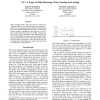Free Online Productivity Tools
i2Speak
i2Symbol
i2OCR
iTex2Img
iWeb2Print
iWeb2Shot
i2Type
iPdf2Split
iPdf2Merge
i2Bopomofo
i2Arabic
i2Style
i2Image
i2PDF
iLatex2Rtf
Sci2ools
AAAI
2007
2007
ESP: A Logic of Only-Knowing, Noisy Sensing and Acting
When reasoning about actions and sensors in realistic domains, the ability to cope with uncertainty often plays an essential role. Among the approaches dealing with uncertainty, the one by Bacchus, Halpern and Levesque, which uses the situation calculus, is perhaps the most expressive. However, there are still some open issues. For example, it remains unclear what an agent’s knowledge base would actually look like. The formalism also requires second-order logic to represent uncertain beliefs, yet a first-order representation clearly seems preferable. In this paper we show how these issues can be addressed by incorporating noisy sensors and actions into an existing logic of only-knowing.
| Added | 02 Oct 2010 |
| Updated | 02 Oct 2010 |
| Type | Conference |
| Year | 2007 |
| Where | AAAI |
| Authors | Alfredo Gabaldon, Gerhard Lakemeyer |
Comments (0)

